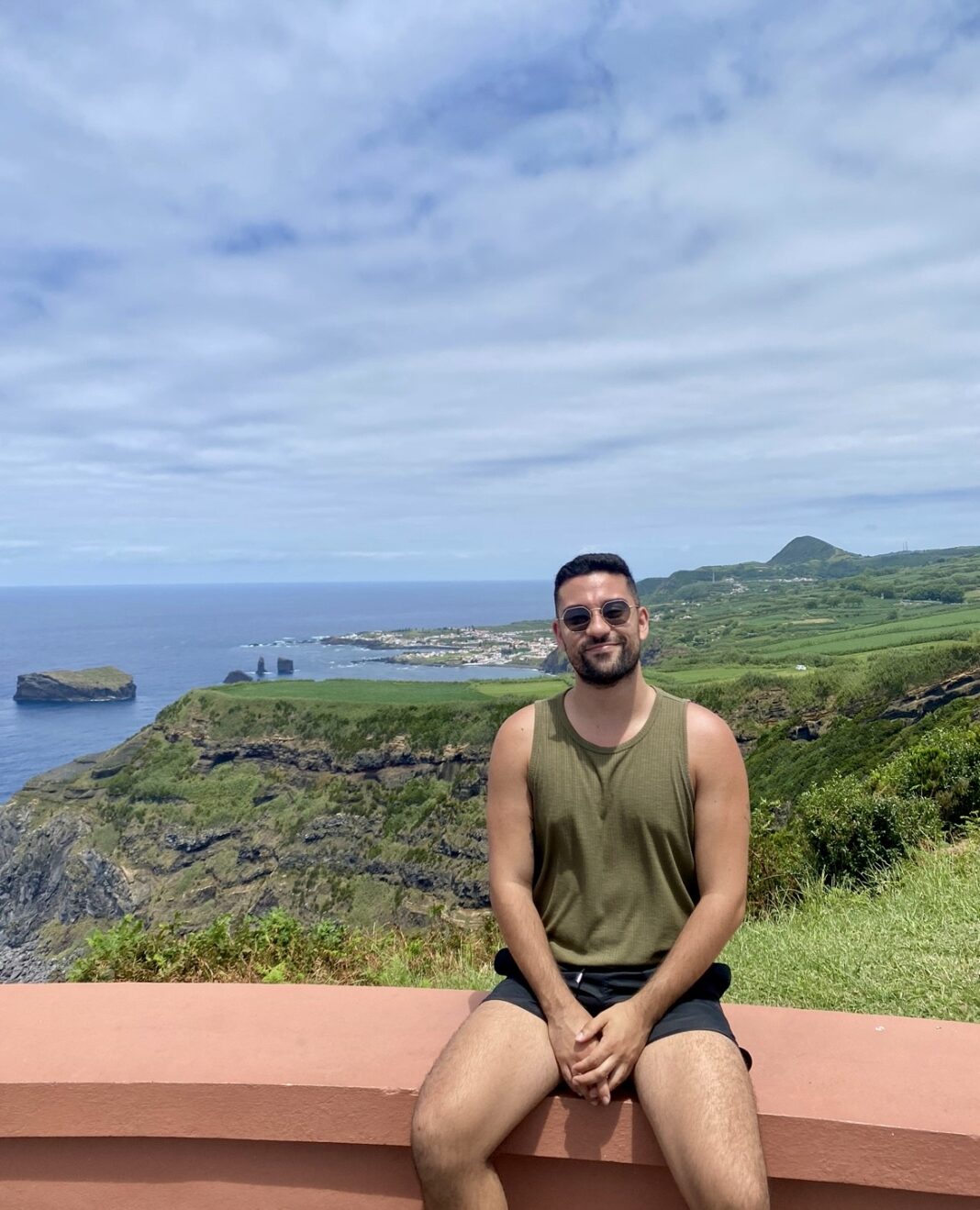Craig Pacheco knows a few things about eating right and taking care of yourself. And himself. The Toronto-based dietitian and digestive health expert has learned to surround himself with queer clients as part of his private nutrition practice.
But his career wasn’t always so cozy. The Toronto-based dietitian and digestive health expert has encountered plenty of homophobia throughout his career in health care.

“Health care isn’t always the most inclusive place for queer people to work and exist,” he tells Pink Ticket Travel. “I often talk to people about some of the negative comments I’ve received from staff, comments about femininity and things like that.”
He now devotes his time to running his private practice, Queerly Nutrition, and teaching nutrition courses at Toronto Metropolitan University. For him, it’s important to help people of all backgrounds, identities and income levels. Helping queer people has always been on Pacheco’s mind. In fact, it’s the reason he shifted from hospital work and pharmacology to dietetics.
“I like dietetics and nutrition because it’s a very interesting field. It’s a very social thing, it’s a very identity thing, but it’s also a very molecular thing.”
With his fellow queers in mind, Pacheco has offered up some valuable travel-related health tips to Pink Ticket Travel.
What are some health tips that you’d share with someone attending, say, an international Pride or another festival abroad? Bonus points if it involves a hangover cure.
So the big one is hydration. A lot of the tips I give for going to things like Pride, or travelling in general, involve having consistent meals, especially if you’re passing a time zone and adapting to a local eating schedule. I think a lot of people, when they go to festivals or Pride, they withhold eating and skip meals, purposely or not. A big thing about hangover prevention and keeping your body nourished, is truly trying to eat as consistently as possible.
Unfortunately, there aren’t many amazing remedies for once you are hungover. At that point it’s about hydration and self-care. You obviously don’t want to make it worse by prolonged sun exposure and not having enough food in your system.
When I work with people who want to maintain good digestive health, especially during things like Pride, I tell them it’s truly just knowing what your safe foods are. And safe snacks as well. Whether you’re staying in a hotel or you’re on buses or trains or planes, it’s making sure you’re optimizing snacks with high-fibre, high-protein snacks—protein bars, trail mix, things like that. So if you can’t control what your meals are, at least you have some safe, well-nourishing snacks that you can have in your hotel room or in your Airbnb or while staying on your friend’s couch.
Since hydration is very important, but buying bottled water isn’t very eco-friendly, what are some alternatives you would suggest for someone trying to stay hydrated?
I always tell people to be aware of what water safety is like in the country they’re in, because in a lot of places, it is quite okay to drink the water. You can always check, and depending on the hotel or the place where you’re staying, they might have their own water purification system.
Drinking plenty of water is huge, especially in the summer. A lot of people have digestive issues simply because they’re dehydrated. If you want to keep good digestion during Pride or while at festivals, try to reduce or limit carbonated beverages. I find that carbonated beverages often create a lot of stomach distress. It also makes people feel full when they’re really not nourished.
Have you ever used a travelling water bottle that filters water?
I don’t think the ones with mechanical filters would be good at filtering out bacteria. They could get rid of some of the minerals and such in there, but they don’t do the same job as boiling.
I imagine you have some clients who have special diets—vegetarians and vegans, for instance. What tips would you give them if they’re travelling in a place that’s very meat-centric?
Most countries and cuisines have vegetarian options, even just vegetable soups. Research the options available, including ingredients that are high-protein. If you’re going to a country that doesn’t use tofu in their ingredients—do they have beans and lentils? If you’re Celiac and can’t have gluten, what gluten-free, natural products do they use?
When a lot of people travel, they sometimes assume they’ll have the same variety of foods at their disposal. But depending on where you’re going, you might have limits as to which types of vegetables and fruits are available locally. That comes back to doing your research.

What travel advice would you give to someone who’s routine-minded, someone who is used to eating a certain number of meals or at certain times of the day when they’re home?
One thing I often tell people is that when travelling, it’s important to get adjusted before resuming their workout routine. A lot of times, digestive issues or eating issues occur because of jet lag and time zone differences. Try your best to first have a consistent sleep schedule and to get some optimal sun to help reset your circadian rhythm. Your whole diet, your appetite, is more regulated when your body is on a certain calendar.
Is there one thing that you personally cannot travel without?
If we want to stay on the topic of food, I always bring protein bars, because I’m a hungry person who eats every two hours. You never know when you’re not going to be fed on a plane. I don’t know if that’s what you’d call snack anxiety, being fearful that you’re going to be stuck in a place without food.
I always bring an over-the-counter digestive like Pepto-Bismol or Tums, because you never really know. You can do everything right, but sometimes your body just doesn’t align well. Other countries have different types of bacteria that your body isn’t accustomed to and might not be able to tolerate.
There’s also some evidence that probiotic supplements can help with things like preventing traveller’s diarrhea.
What’s one of the most memorable trips you ever had?
Peru. I did a four-day hike to Machu Picchu. It was really cool because it felt like a good way to get to know the culture. I got to really experience the local cuisine—for example, avocados from an avocado farm, picked right out of the fields.
More recently, I went to the Azores, the Portuguese islands where my dad is from. It was a nice combination of great food, great people and outdoor spaces. I’ve always had an affinity for eating a lot of cheese, milk and yogurt. And their whole economy is based off of just dairy production. So, I was like, do I like dairy because I just like dairy? Or is this something that my body gravitates to genetically? That was another example of a place with limited availability of fruits and vegetables. There were, like, five types of each. So if you’re a picky eater, it would be a little tough.
Or if you’re a dietician.
But I loved it. I often tell people that it’s good to have the availability of a kitchen, where you can have a stock of some things, so that you can make a consistent breakfast. That is something that sets you up strongly for the day. So for example, almost every morning, I have yogurt, a bran cereal and fruit. And I try to continue that while on my trip.
Are there any particular tips that you share with poly or ethically non-monogamous clients?
If someone’s poly, but they all live together, it might be more about the division of meals, the division of responsibility, planning meals for three people, even though a lot of resources are built for couples. It can be more difficult for poly families, or mixed and blended families. Let’s say someone spends three days with one partner, two days with another and then maybe they live on their own, or perhaps there’s another partner. So, how are you going to still feed yourself or rely on home-cooked meals when you don’t have a consistent location?
Some of my clients who have multiple partners like spending date nights with their partners, but then it ends up being four nights a week of going out for dinner, and they want to reduce that.
One final question. Are you single?
I’m not. [Laughs.] But I can pretend I am, just for fun.
This interview has been edited for length and clarity.


